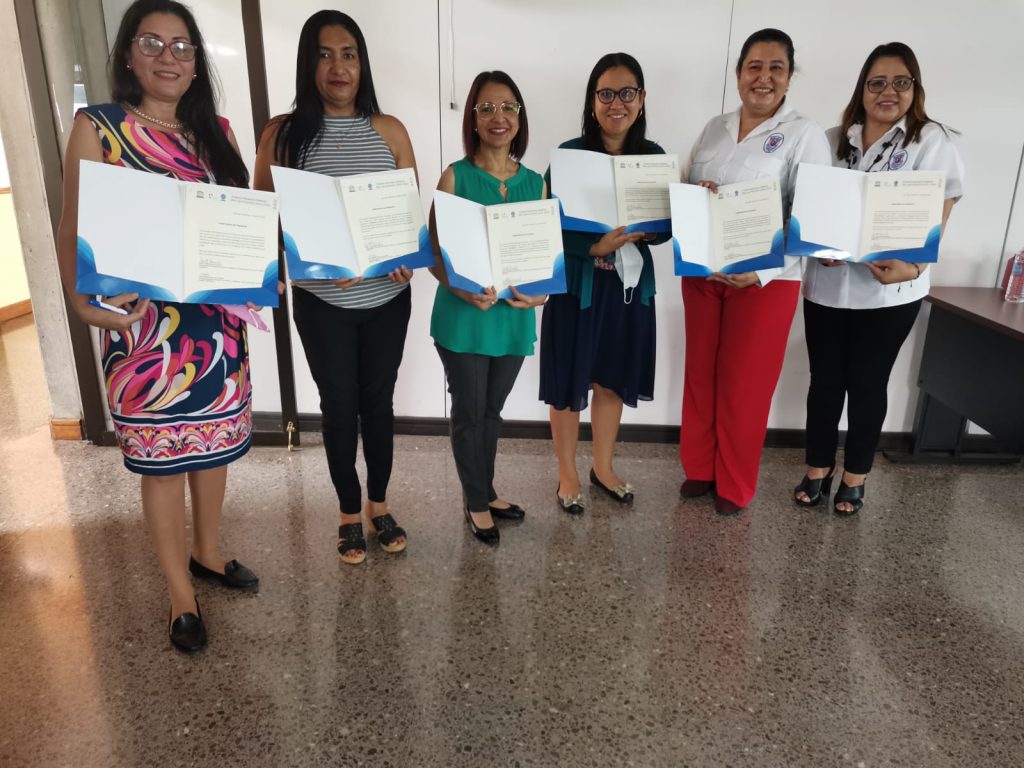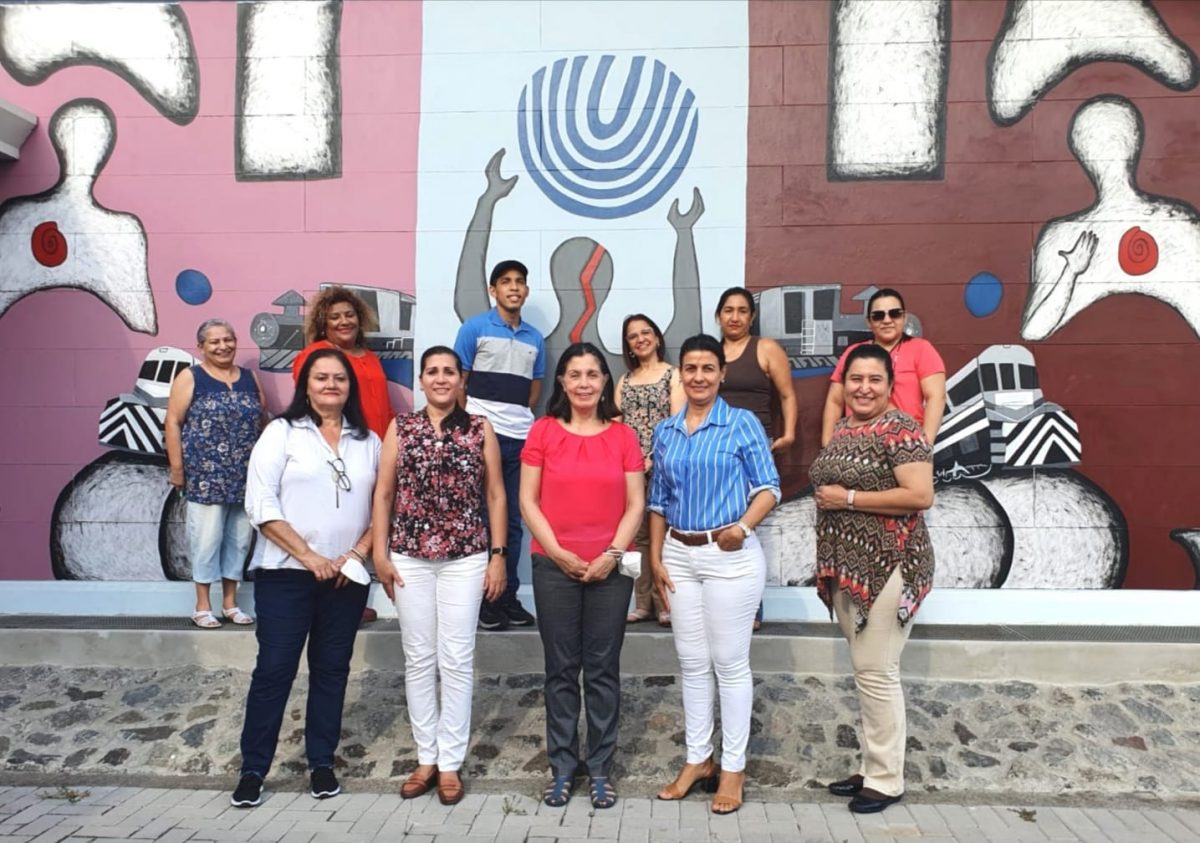In the context of the project Educación a distancia: una oportunidad para todos, liderado por la Universidad Estatal a Distancia (UNED) de Costa Rica y financiado por la UNESCO, se contempló como parte de las actividades, la realización de una pasantía para las personas académicas que, por medio del proyecto, se forman en educación a distancia, esto con el fin de conocer el desarrollo y las áreas estratégicas sustanciales del modelo educativo de la UNED.
El proyecto inició con la participación de 25 personas funcionarias académicas de las siguientes universidades: Universidad Nacional Autónoma de Nicaragua (UNAN-Managua), Universidad Tecnológica de Panamá. (UTP), Universidad Pedagógica Nacional Francisco Morazán, (UPNFM. Honduras), Universidad de El Salvador (UES), Universidad de San Carlos de Guatemala (USAC) y Universidad Autónoma de Santo Domingo, (UASD. República Dominicana).
En el período comprendido entre el 16 y el 21 de febrero, se recibió al primer grupo de pasantes, este estuvo conformado por doce personas académicas de la Universidad Autónoma de Santo Domingo, República Dominicana (UASD), quienes realizaron la pasantía, participaron en las diversas actividades programadas y lograron relacionar lo estudiado en los módulos cursados.
Un segundo grupo de personas estudiantes visitaron la UNED del 27 de marzo al 2 abril, procedentes de universidades del Istmo Centroamericano, entre ellas, la UTP, UPNFM, UES y USAC, quienes también vivieron la experiencia de acercarse al desarrollo de la UNED, en particular para comprender el modelo educativo mediante las actividades realizadas durante la pasantía y relacionar las temáticas ya estudiadas.
The project Educación a distancia: una oportunidad para todos es liderado en la UNED, por un equipo de trabajo conformado por la Dra. Yarith Rivera Sánchez, quien lo coordina; la Dra. Viviana Berrocal Carvajal, co-coordinadora; y la Dra. Evelyn Gutiérrez Soto, las tres funcionarias de la Escuela de Ciencias de la Educación (ECE); la Ing. Cecilia Barrantes Ramírez y la Licda. Maritza Rojas Pérez, ambas funcionarias de la Dirección de Internacionalización y Cooperación (DIC)
La iniciativa ha contado con la colaboración y el apoyo del rector de la UNED, Rodrigo Arias Camacho, de la vicerrectora Académica, Maricruz Corrales Mora, y de la directora de la ECE, Linda María Madriz Bermúdez. El proyecto fue declarado de interés institucional, mediante acuerdo del Consejo de Rectoría de la UNED, sesión 2197-2021, Artículo I, inciso 10), celebrada el 15 de noviembre del 2021.
En relación con el trabajo desarrollado, Yarith Rivera Sánchez, coordinadora del proyecto, comentó: “el proyecto consiste en transferir conocimiento y experiencias a seis universidades de la región centroamericana y República Dominicana. La intención sustantiva se centra en que las instituciones de educación superior que participan puedan desarrollar, mejorar o fortalecer modelos de educación a distancia con el uso de la virtualidad, de forma que se facilite la educación a las personas, que por diversas situaciones tienen impedimentos para asistir de manera presencial a las universidades, considerando el panorama que se vive en la actualidad”.
El proyecto nació como respuesta a los desafíos que presenta la nueva realidad mundial en el tema de la educación superior y que ha sido fuertemente afectada por la pandemia del COVID- 19. La UNED logró la aprobación del proyecto por parte de la Organización de las Naciones Unidas para la Educación, la Ciencia y la Cultura (UNESCO), dentro del programa de participación para el Bienio 2020- 2021.
En este contexto, Rodrigo Arias Camacho, rector de la UNED afirmó: “nos llena de satisfacción poder compartir nuestro modelo educativo con las universidades de Centroamérica y de República Dominicana, porque creemos que eso que hace dos años llamábamos nueva normalidad implica modificaciones profundas y permanentes en la educación, en donde se ha ido avanzando, consolidando nuevas formas de aprender en el proceso de enseñanza y aprendizaje, y que nos obligó a llevar adelante con creatividad estos nuevos cambios, que no solo se deben mejorar día a día; sino que deben de ser equitativos los servicios de aprendizaje, para que la persona pueda aprender en cualquier momento y en cualquier lugar”.
Maricruz Corrales Mora, vicerrectora Académica, recalcó la importancia de la iniciativa y su vinculación con la educación a distancia, gracias “ al trabajo en conjunto en donde se han logrado superar retos tan complejos como los que vivimos en estos dos últimos años con la pandemia, en este sentido, este proyecto contribuye a fortalecer el talento humano que hace posible compartir nuestro modelo educativo, que demanda una serie de procesos de contenido y virtualización educativa, que nos permite como institución y como profesorado estar más cerca del estudiante. Por ello, la educación a distancia no es simplemente colocar contenidos en internet, es toda una visión sistémica de la educación donde se dio un salto significativo en la educación en general, donde el docente es una figura institucional, que marca una clara diferencia con todo lo que es la tradición educativa universitaria”.
Durante la pasantía las personas participantes conocieron el quehacer de varias dependencias como la Dirección de Producción de Materiales Didácticos (DPMD), así como sus programas: Producción de Material Didáctico Escrito (PROMADE), Videoconferencia y Audiográfica (VICOM), Producción de Material Audiovisual (PPMA), Aprendizaje en Línea (PAL), Producción Electrónica Multimedial (PEM), además las instalaciones del Centro de Información, Documentación y Recursos Bibliográficos (CIDREB), la Editorial UNED (EUNED), el Centro de Capacitación en Educación a Distancia (CECED), el Programa de Apoyo Curricular y Evaluación de los Aprendizajes (PACE).
La pasantia también incluyó la visita a las sedes universitarias de San Marcos, Puntarenas, Orotina y Escazú, lo que permitió a las personas pasantes visualizar en forma general cómo funciona una sede, conocer los servicios que brindan a la población y los nuevos retos de la UNED desde las sedes y la importancia de la proyección en los territorios.
Linda Madriz Bermúdez, directora de la ECE, evidenció la importancia del proyecto al señalar que: “en primera instancia compartimos con nuestras universidades hermanas centroamericanas una serie de realidades y limitaciones y retos. Puede ser mucho más significativo el hecho de que aprendamos juntos y de forma colaborativa, que simplemente importar propuestas y en segunda instancia el hecho de que la educación a distancia en sus diferentes modalidades, vino para quedarse y con la pandemia reforzó que es la educación que realmente facilita y asegura equidad y oportunidades para todas las personas en los diferentes lugares en que se encuentren. De igual manera, hay una serie de retos, porque, aunque es una oportunidad maravillosa, se debe velar por la calidad de la misma para que realmente sea significativa para esas personas ,que tienen esa necesidad de aprender”.
Finalmente, es sustancial destacar que el proyecto ofrece a la UNED la oportunidad de dar a conocer una vez más, a nivel internacional, el desarrollo y los conocimientos en materia de educación a distancia, y a las universidades participantes, les posibilita apropiarse de herramientas y conocimientos para comprender el modelo, mejorar prácticas ya existentes en los contextos universitarios representados e iniciar procesos hacia este modelo de educación.
Las personas académicas participantes they think
Mariela Román Barrios, asesora profesional especialista en Educación a Distancia en Entornos Virtuales del Sistema de Estudios de Postgrado (CG-SEP) de la Universidad de San Carlos de Guatemala, comentó que “ los aportes que obtuvo de la pasantía fueron excelentes por parte del personal de UNED. Es verdaderamente un compromiso de proyección hacia la comunidad educativa centroamericana, para apoyar a las instituciones de educación superior que estamos en el proceso de implementación de la educación a distancia. Se aprende de manera profunda y significativa de la organización, procesos, experiencias y de la ejecución profesional, mediada y organizada de proyectos de educación a distancia.
Asimismo, Román Barrios indicó: “estoy profundamente agradecida por los conocimientos adquiridos, que son muy prácticos y nos motivan a continuar en la planeación, ejecución y evaluación de proyectos a distancia en entornos virtuales en el Sistema de Estudios de Postgrado de la Universidad de San Carlos de Guatemala”.
En esta misma línea, Lorena Margarita Ramírez Mercado, quien es profesora universitaria y coordinadora del primer curso de Educación a Distancia en la Facultad de Química y Farmacia, de la Universidad de El Salvador, manifestó: “Esta pasantía me parece sumamente importante para terminar de comprender el modelo de educación a distancia y para darse cuenta que, este modelo implica toda una organización y compromiso institucional, en donde una serie de departamentos o unidades brindan el soporte y asesoría necesaria a docentes y estudiantes para que el modelo funcione y mejore día con día. Además, este modelo garantiza el derecho a la educación para todos y que la universidad se acerque a las comunidades más lejanas. Esta pasantía me ha mostrado la importancia de la organización institucional en donde se trabaja de forma articulada para un mismo fin”.
La representación de la Universidad Pedagógica Nacional Francisco Morazán recayó en Jenny Margoth Zelaya Matamoros, quien es la vicerrectora de Educación a Distancia y quien señaló que “la pasantía es la actividad académica que concretó todos los módulos que hemos tomado hasta ahora. La pasantía les dio sentido a todos los conceptos aprendidos”.
Desde Panamá participó la ingeniera de proyectos Luiyiana Del Carmen Pérez, quien es la coordinadora de la Facultad de Ingeniería de Sistemas Computacionales en el Centro Regional de Azuero de la Universidad Tecnológica de Panamá, quien acotó que “la pasantía ha sido para mí la actividad cumbre del diplomado Educación a Distancia: Una oportunidad para todos, ya que me ha permito interiorizar todos los conocimientos adquiridos durante casi un año de estudio a la distancia, así como despejar cualquiera duda del modelo de educación a distancia de la UNED, el poder observar todo ese trabajo coordinado por un equipo multidisciplinario que trabajan motivados por un objetivo en común, ofrecer la educación a toda una población sin poner fronteras. Con los 45 años de fundación la UNED, se proyecta internacionalmente con una base sólida de la formación a distancia, a través de la integración de cinco programas: PROMADE, PMA, PEM, VAU y PAL, articulados con los lineamientos del PACE”.
“Con esta pasantía me llevo un modelo de formación de éxitos, gracias a un personal que fomenta valores como: el servicio y la empatía para aquella población vulnerable, sinergia por el trabajo en equipo que siempre dar la milla extra por ofrecer la oportunidad de penetrar al maravilloso mundo del saber y contribuir al desarrollo profesional de la población. Gracias a UNESCO por la oportunidad y la UNED por abrir sus puertas para replicar su modelo en la Universidad Tecnológica de Panamá. Termino con esta frase de Alberto Einstein “La mente que se abre a una nueva idea, jamás volverá a su tamaño original, mencionó Del Carmen Pérez”.
Para más información sobre este proyecto puede contactar a Yarith Rivera Sánchez al correo: yrivera@uned.ac.cr o a Cecilia Barrantes Ramírez al correo: cbarrantes@uned.ac.cr


